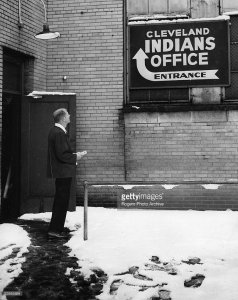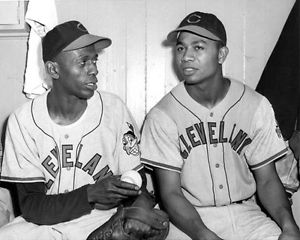
Veeck outside the Indians offices, 1947
Fresh out of the military, Veeck took his cash from the Brewers sale and realized his dream – ownership of a Major League Baseball team. Well, technically Major League; he bought the Cleveland Indians, who last won a pennant in 1920, and who played half their home games in ancient League Park, built in 1891.
Veeck had tried to buy the Philadelphia Phillies, who had filed for bankruptcy, in 1942, but rumours that he planned to restock the wartime-depleted Phils’ roster with Negro League players caused the sale to be blocked by Commissioner Landis and National League president Ford Frick.
Major League Baseball did finally integrate in 1947, when Jackie Robinson took the field for the Brooklyn Dodgers. What is less well-known is that Larry Doby was signed by Veeck in the summer of 1947, and made his debut mere weeks after Jackie, becoming the first African-American player in the American League. Manager Lou Boudreau took Doby around the Indians clubhouse and introduced him to his teammates. Any man who wouldn’t shake his hand was quickly traded or sold.
Veeck also signed the seemingly ageless Negro League star pitcher Satchel Paige, who,

Satch with Larry Doby
depending on who you believe, was somewhere between 38 and 47 years old in 1947 (Veeck’s own research seemed to indicate he was born July 7, 1906, which has since become the “official” date). Everyone around baseball was convinced that this was some sort of publicity stunt; well, everyone but Satch; he pitched 155 ⅔ innings, with a 2.78 ERA, in his two years with Cleveland. According to Veeck’s autobiography, “Veeck as in Wreck”, Paige apparently didn’t have a breaking pitch when he came to Cleveland; he had survived all those years in the Negro Leagues (and all those barnstorming tours against Major League All-Stars) with pinpoint control, the ability to change speeds, and a variety of deceptive deliveries.
Moving full-time into Cleveland Municipal Stadium, and broadcasting all of the team’s games on radio, allowed the Tribe to set an all-time Major League single season attendance record in 1948; 2.6 million, which would not be eclipsed until the Dodgers moved into Chavez Ravine in 1962. The uptick of bums in seats was also a result of a spectacular turnaround of the team’s on-field fortunes; the Tribe went 266-197 (.575 winning percentage) in 1946-49, and they beat the Boston Braves in 1948 for their first World Series victory in a generation.
However, all good things must come to an end, and so it was with Veeck and the Indians. Toward the end of his reign in Cleveland, he was involved in messy divorce proceedings from his first wife and, being that all his money was tied up in the ballclub, was forced to sell to pay the settlement. This might sound familiar to early 21st-century Dodgers fans…